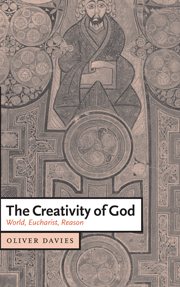Book contents
- Frontmatter
- Contents
- Acknowledgements
- Introduction: the cosmological imperative
- Part I An archaeology of createdness
- 1 The architecture of createdness
- 2 The metaphysics of createdness
- 3 Cosmological fragments
- Part II Scriptural cosmology
- Part III Eucharistic wisdom
- Conclusion: cosmology and the theological imagination
- Select bibliography
- Index of biblical citations
- General index
2 - The metaphysics of createdness
Published online by Cambridge University Press: 10 December 2009
- Frontmatter
- Contents
- Acknowledgements
- Introduction: the cosmological imperative
- Part I An archaeology of createdness
- 1 The architecture of createdness
- 2 The metaphysics of createdness
- 3 Cosmological fragments
- Part II Scriptural cosmology
- Part III Eucharistic wisdom
- Conclusion: cosmology and the theological imagination
- Select bibliography
- Index of biblical citations
- General index
Summary
Sola autem natura rationalis creata habet immediatum ordinem ad
Deum. Quia ceterae creaturae non attingunt ad aliquid
universale … natura autem rationalis, inquantum cognoscit
universalem boni et entis rationem, habet immediatum ordinem ad
universale essendi principium.
The rational created nature alone is immediately ordered to God, for
the other creatures do not attain something universal … But the
rational creature, insofar as it knows the universal ratio of good and
being, is immediately ordered to the universal principle of being.
Thomas Aquinas, Summa TheologiaeIn the previous chapter I reviewed the structure of a pre-modern sense of embodiment. It is this primary cosmological perspective which provides the context for an analysis of the pre-modern self, thinking, feeling and perceiving in a world very different from our own. The argument that I am advancing throughout this book is that the way we reason is intimately bound in with our understanding of the world, and our pre-conceptual sense of being in the world. In this chapter I address the philosophical conceptualisation of the world which was achieved in the theory of the transcendentals. The theory of the transcendentals affirmed the primacy of being, the good and the true, as rooted in the divine causality itself, together with their equivalence or ‘convertibility’. It therefore turned on the belief that the world is fundamentally united and is so on account of the common relation of all that exists with the Creator God.
- Type
- Chapter
- Information
- The Creativity of GodWorld, Eucharist, Reason, pp. 29 - 49Publisher: Cambridge University PressPrint publication year: 2004

